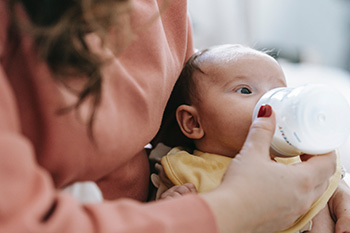One of the common questions of new parents is whether cold formula causes gas in the baby’s gut. The answer is Yes and No both. The cold formula is safe for the baby as long as it is naturally cold down to room temperature. But if it’s been refrigerated for too long, or mixed with freezing cold water, then it can cause gas in your baby’s stomach.

As parents, you should and you must observe what is causing the gas to prevent it. But, you should also accept the fact that it will happen no matter what you do. It’s a very normal and expected issue with the newborns.
The temperature of a formula usually doesn’t have any direct impact on the baby’s stomach. However, it might depend on a few things for a cold formula to produce gas.
You May Also Like: Can You Eat Baby Powder?
Does Cold Formula Upset Baby’s Stomach?
It does not always, but it may sometimes. Cold formula can upset the baby’s stomach. Not necessarily, an upset stomach means only about gas or colic. It can mean poor digestion too.
Basically, there is no scientific evidence that could explain cold formula being the reason for abdominal gas in babies.
However, some parents observed that cold formulas can cause gas. But, studies and statistics show us that a room temperature or slightly cold formula is beneficial for the child to digest. Nonetheless, if it is freezing cold, then it might cause digestive issues.
Some babies have their own preferences of food temperature just like the adults. Other babies have tolerance issues. So, if your baby is intolerant to cold formula, it can upset her stomach by impacting his digestive system.
Another issue can be with the bottle with what you feed the formula. If not sterilized well, bottles can trap and culture harmful germs and bacteria like Cronobacter, hepatitis A, rotavirus. Especially refrigerated and cold bottles creates a suitable condition for these germs to grow.
Unclean bottles can cause viral gastroenteritis. It may cause abdominal gas, diarrhea, vomiting and cramping in the baby’s stomach. This is why sometimes it is heard that a cold formula causes gas or colic. Whereas most people are unaware that it’s the cold bottle, not the formula.
Is Cold Formula Harder to Digest?
Although most babies can digest both warm, neutral and cold milk just fine. But, in general, cold formula or milk is a little harder to digest comparatively.
Milk and formulas have fat contents. Cold milk or formula slows down the digestive process in your baby’s gut. So, it takes the stomach muscle to work harder to digest the food. Most babies do not have any problem digesting it.
But infants with a sensitive stomach sometimes suffer indigestion. Indigestion causes stress which can cause excessive gas, cramps and vomiting.
Besides, while mixed with cold water the formula sometimes does not mix well. Again, when a well-mixed formula cools down, it becomes thicker in texture. Such uneven mixture or thicker texture of the formula becomes harder to digest for the babies.
Read Also: If Baby Spits up Should I Feed Again?
How to know if Cold Formula is Causing Colic?
Although colic is a very common and expected issue, it’s important to prevent or minimize the problem.
There is no scientific reasoning or proof that can explain whether a cold formula is causing colic to your baby. So, there is no proven method of testing whether the reason is cold milk or formula.
The only way left to know for sure is the “Elimination Diet” method. To perform the test, you need to keep everything just as before. Just quit giving your baby cold formula. Start giving your child the same formula, but make sure it’s warm.
Observe for a few days or perhaps one or two weeks. If you see any improvement in the frequency of having a colic, then you can be sure that your baby is sensitive to the cold temperature of the formula.
But if you do not see any changes then you need to look for other indicators. It may be the bottle you feed with, or it might be the specific formula you are currently giving your baby.
When Should You Switch Your Current Formula?
Random colic, spitting and refluxes are common in babies. Infants below 3 months of age usually spit or vomit 2-3 times a day, especially after the feeding.
However frequent reflux after feeding each time can be a significant sign telling you to change the formula.
Additional signs to look for include constant irritation and fussiness in babies. If they refuse to eat and seem to have excessive gas, then there might be some elements present in your current formula that are not suiting the baby’s stomach and need to switch your formula.
Sometimes, babies have their unique preferences for formula. They simply don’t like certain formulas and resist while feeding them. So, try out new formulas to know your infant’s favorite.
Besides all of that, if your baby is losing weight and pooping more frequently then see a pediatrician as soon as possible and change the formula as soon as you can. Almost all baby formulas contain ingredients that are beneficial and safe for children. Certain formulas are lower in quality, whereas there are some others that contain allergic ingredients.
However, for any reason among these reasons mentioned above, if you feel the need to change your current formula, consult your pediatrician first. Remember that, you can only guess the measures of a problem. You are not a specialist. So, consult your doctor to choose the right alternatives.
Which Elements Should You Consider While Choosing a Formula for Gassy or Colic Baby?
It’s always wise to consult with your child’s pediatrician before switching to a new formula. Because a specialist knows the history of your child’s health and they know what’s best for him and what to avoid in his diet.
However, if your baby has a normal tolerance for formulas, then you can try out most of the formulas out there in the market for a change. But, some babies are intolerant to the typical formula. They tend to get gassy, fussy and colic if fed the typical formulas.
If your baby belongs to that category, you should opt for a formula labeled as suitable for babies with gas, fussiness or colic, with the specialist’s recommendation if possible.
Usually these gas and colic friendly formulas include these following ingredients that help to prevent and reduce gas formation in your baby’s sensitive gut.
- Hypoallergenic Formula: These formulas contain predigested Casein. It’s a protein compound that’s found in milk, broken into smaller compounds for easy digestion.
- Lactose-Free Formula: Not all babies, but a handful are still out there who are intolerant to lactose. Lactose is a sugar component that’s found in milk as well. In a lactose-free formula, the lactose compounds are replaced with other natural sugar components like sucrose or glucose.
- Soy Milk Formula: This is a great choice for vegan families. However, it’s also suitable for babies who are intolerant to cow’s milk. In these formulas, they use soy milk instead of cow’s milk as the primary source of protein.
Conclusion
Long story short, cold formula doesn’t cause abdominal gas or colic. It has no direct impact on the baby’s stomach. Without combining with other causes, cold formulas do not cause gas.
So, it’s totally safe to give your baby cold formulas. In fact, a cold formula is somewhat better than a fairly warm or hot formula that can burn your child’s mouth.
If your baby likes it and has no other issues, you can continue giving him cold formula without any guilt. But if they don’t prefer it, you always have multiple options to switch.

1 thought on “Does Cold Formula Cause Gas?”